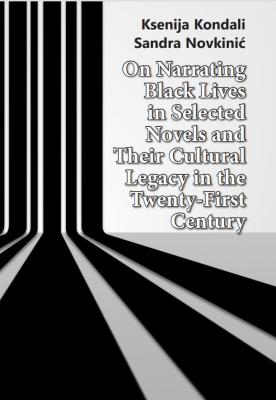On Narrating Black Lives in Selected Novels and Their Cultural Legacy in the Twenty-First Century
Keywords:
Africa, Black Atlantic, Canada, colonialism, cultural studies, globalisation, history, human rights abuse, literary history, literary studies, postcolonialism, race, slavery, violence, #BlackLivesMatterSynopsis
Positioned at the crossroads of cultural studies, human rights studies, literary theory, and postcolonial studies, this volume examines the narration of Black lives exemplified by selected literary texts from diverse contexts penned by various authors, united by their original analysis of past and current racially motivated abuses. Recognising the need to engage with hegemony and Eurocentrism in their various literary forms as instrumental in contemporary literary criticism, the book discusses the representation of the Other and the ramifications of slavery in Joseph Conrad’s Heart of Darkness, J. M. Coetzee’s Waiting for the Barbarians, and Esi Edugyan’s Washington Black. Employing theoretical foundations from multiple cultural and literary studies, this book sheds light on issues related but not limited to imperialism, systemic violence, race, belonging, as well as the continuing practices and lingering effects of ethnocentric and colonial ideologies. At the same time, the analysis considers the pernicious consequences of widespread human rights abuses against the backdrop of twenty-first-century socio-political, economic and cultural global realities.
***
Na presjecištu studija kulture, ljudskih prava, književnih teorija i postkolonijalnih studija, knjiga propituje narative o životima Crnaca na primjerima iz odabranih književnih tekstova različitih autora koje povezuje originalna analiza prošlih i aktualnih rasno motiviranih zlostavljanja. Ova monografija prepoznaje potrebu da kritički ukaže na hegemoniju i eurocentrizam u različitim književnim oblicima kao ključnim aspektima u savremenoj književnoj kritici i s tim ciljem bavi se predstavljanjem Drugog i posljedicama ropstva u književnim ostvarenjima "Srcu tame" Josepha Conrada, "Čekajući barbare" J.M. Coetzeeja i "Washington Black" Esi Edugyan. Uz primjenu glavnih teorijskih načela nekoliko kulturnih i književnih studija, knjiga osvjetljava pitanja koja se tiču, između ostalog, imperijalizma, sistemskog nasilja, rase, pripadanja, kao i kontinuiranih praksi i posljedica etnocentričkih i kolonijalnih ideologija. Istodobno, ova analiza razmatra opasne posljedice rasprostranjenog kršenja ljudskih prava u kontekstu globalnih društveno-političkih, ekonomskih i kulturnih perspektivau dvadeset prvom stoljeću.
Chapters
-
1. Introduction
-
2. Key Aspects of Postcolonialism
-
2.1. Theoretical Framework: A Brief Overview
-
2.2. Cultural Violence: Culture and Myths
-
3. Joseph Conrad’s Representation of the Congo
-
3. 1. The Horror and the Silence
-
3.2. Conrad and the Congo
-
3.3. The Jungle of Death
-
3.4. White Shirts and “Beasts”
-
4. Coetzee’s Portrayal of South Africa
-
4.1. Introduction: South Africa’s Apartheid
-
4.2. Barbarians and Enemies
-
4.3. “Fallen Creatures”
-
5. Esi Edugyan’s Washington Black
-
5.1. Introduction: African Enslavement in Transatlantic (Re-)Consideration
-
5.2. Narratives of Slavery and Challenges of Representation
-
5.3. (Black) “Canadianness” in Literature
-
5.4. Washington Black: A Narrative of (Post-)Slavery
-
5.5. Enlightenment Science and Slavery
-
6. “We the People”
-
6.1. Free and Equal?
-
6.2. Equal but Separated
-
6.3. I’m Still Here and Its Backlash
-
7. Making Monsters
-
7.1. The United States of America
-
7.2. The Republic of South Africa
-
7.3. The Democratic Republic of the Congo
-
8. Conclusion
-
Bibliography
-
Index
Downloads
References

Downloads
Published
Categories
License

This work is licensed under a Creative Commons Attribution-NonCommercial-NoDerivatives 4.0 International License.
